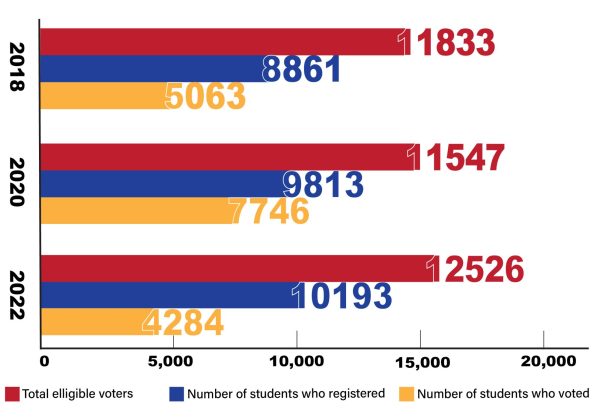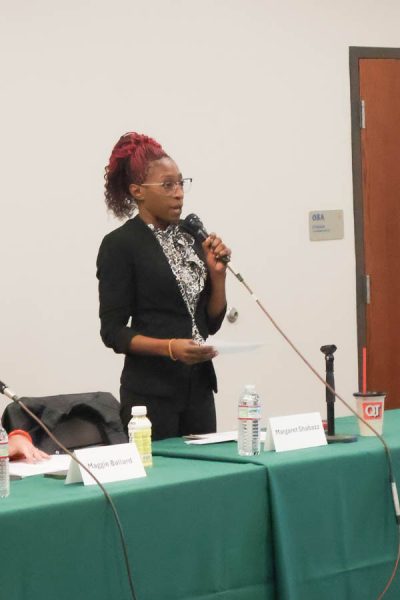Faculty give final approval to gen ed credit hour cutback
Faculty vote on a proposed gen ed revision at the General Faculty meeting on Nov. 11 in the CAC Theater.
Next school year, incoming Wichita State students will have fewer mandatory general education courses. All WSU students are required to complete at least 120 credit hours to graduate, but WSU’s general faculty moved to drop the number of required gen ed credit hours from 42 to 36.
The proposal, which passed Faculty Senate last month, was approved by a vote of 165-69 at Monday’s General Faculty meeting.
Current students will have the option to switch to the 2020 catalog to cut back on gen eds, but doing so will likely mean other changes to their degree requirements.
2020 General Education Requirements
- fine arts: 3 credit hours
- humanities: 3 credit hours
- social sciences: 3 credit hours
- math/natural science class: 3 credit hours
- basic skills: 12 credit hours
- gen ed electives: 12 credit hours
“KU and K-State require 30 to 36 [gen ed credit hours], and our peer institutions are at 30 to 36 hours, so I speak in favor of this proposal that would help some of the programs that have been impacted by the board of regents’ requirement,” aerospace engineering professor Roy Myose said before the vote.
The Kansas Board of Regents requested in 2017 that universities cap degree programs at 120 total credit hours to promote on-time degree completion.
Sociology professor Chase Billingham took issue with the notion that the Regents’ request necessitates gen ed cutbacks.
“KBOR has been very clear that they acknowledge that some courses of study — especially for reasons of licensure or accreditation — may require more [credit hours] than [120], and so they built into the process a possibility for exceptions,” Billingham said. “Many of our departments at this university have already applied for and been granted those exceptions.”
Billingham went on to say that scaling back gen ed requirements “impoverishes the education” students receive.
“This is the only institution for 100 miles in any direction that delivers that rigorous and deep and broad education that our students need, and this proposal is going to do great harm to that component of our mission,” he said.
Neal Allen, political science department chair, told faculty that WSU likely stands to gain institutionally by implementing the revised gen ed policy.
“As someone who tries at least to be an analyst of Kansas politics, I think that this probably helps us in general with our relationship to the board of regents and to the legislature,” Allen said.
Aleks Sternfeld-Dunn, director of the School of Music, said gen ed requirements likely deserve to be revisited in the near future.
“While I support this proposal as it stands and would like to see it pass, I also believe it’s just a bandaid on what is a much bigger question about what general education should be in 2019 for our students at Wichita State,” Sternfeld-Dunn said.
“I also, if this were to pass or not to pass, would probably come to the senate with a proposal that a new committee should come together to give a much deeper and longer-term thought on general education.”
History professor George Dehner said Sternfeld-Dunn’s message compelled him to vote against putting a “bandaid” on general education.
“If this is an issue that needs to be debated and discussed further, it should begin with projections about what the impact is going to be with these changes,” Dehner said. “What we’re seeking to retain in this gen ed education program — what we as the faculty of this university want general education to be.”

Matthew Kelly is a former editor-in-chief and managing editor for The Sunflower. Kelly graduated in 2020 with a bachelor’s degree in political science...










